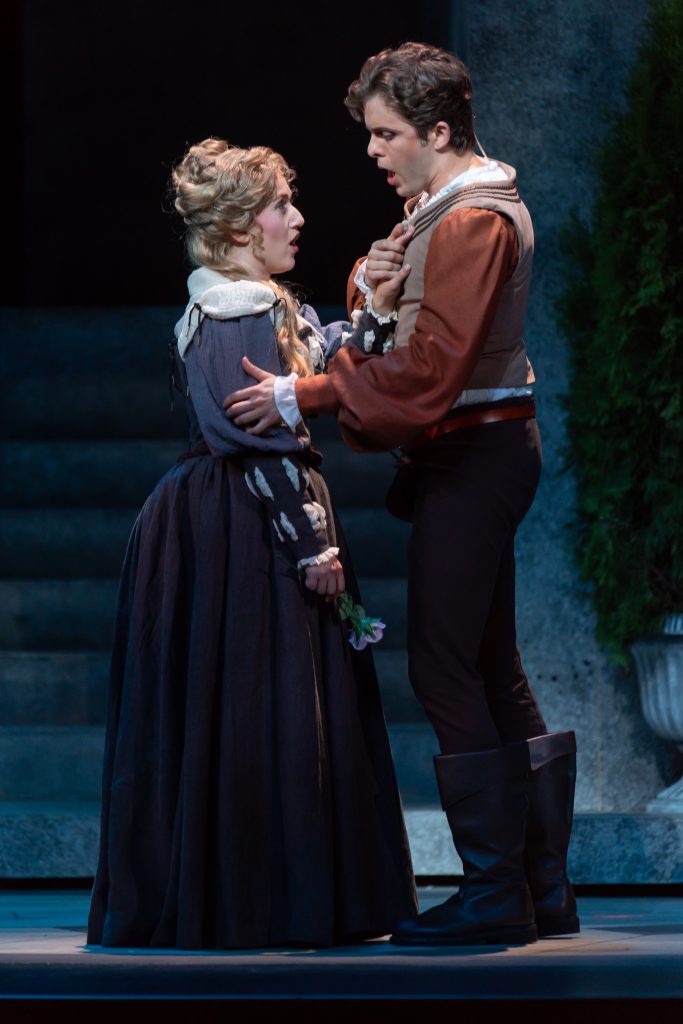A finely sung, imaginatively staged “Rigoletto” on a rainy night at Wolf Trap

Mané Galoyan and Piotr Buszewski in Verdi’s “Rigoletto” at Wolf Trap Opera. Photo: Scott Suchman
Wolf Trap Opera Company offers an annual one-night opera in the Filene Center, the massive outdoor theater at America’s first national park for the performing arts. The weather did not cooperate for this year’s performance of Verdi’s Rigoletto on Friday night, forcing the lawn picnickers into seats under the roof to avoid the rain. (Sadly, the storms did not linger to provide real lightning for the final act.)
Wolf Trap fielded an admirable cast of rising singers for all of this opera’s challenging roles. Tenor Piotr Buszewski swaggered vocally and physically as the arrogant Duke of Mantua, his full high notes taken with gusto. He tended to scoop to higher pitches and did not always release elegantly at the top, quirks that were magnified by the Filene Center’s amplification (a necessary evil but with disappointingly canned results in the house).
Kidon Choi’s imperious baritone met all the demands of the title role, but his characterization of the vicious jester felt shallow. Part of this was because of director Crystal Manich’s use of a distracting ventriloquist dummy that Rigoletto carried throughout the first act, trivializing the character’s venomous side. Verdi’s prowess in musical characterization creates many layers of emotional complexity in the role, more of which Choi’s interpretation will likely encompass as he gains experience.
Armenian soprano Mané Galoyan shimmered with virginal innocence as Gilda, the jester’s impressionable and ruinously short-sighted daughter. Her “Caro nome” showed rich vocal qualities, with the endless ornamentation skillfully negotiated. The alluring, robust mezzo-soprano of Zoie Reams as Maddalena rounded out an excellent quartet (“Bella figlia dell’amore”) in the third act. With four matched voices, each expressing such clashing emotions and perspectives, it is one of the highlights of the Verdi repertory.
The tall, handsome bass Patrick Guetti, alumnus of Washington’s own Catholic University of America, brought a menacing tone to the assassin Sparafucile, with shadowy low notes. Baritone Joshua Conyers howled with indignation as the affronted Monterone, cursing the Duke for seducing his daughter. Washingtonians can look forward to hearing him again this fall in the young artist program at Washington National Opera.
Grant Gershon, artistic director of Los Angeles Master Chorale and resident conductor of Los Angeles Opera, continued a six-year run as conductor of this annual event. For this performance he and members of the National Symphony Orchestra returned to the pit, avoiding the coordination problems in evidence when they were placed at the back of the stage in some past years. As seen from large video screens visible in the house, Gershon’s beat was admirably clear, and he provided enough rhythmic flexibility for the singers to negotiate their more florid passages.
The highlight of these annual summer operas, in spite of the humidity and mosquitoes, has often been the playing of the NSO musicians. The flutes wandered amiably in “Caro nome,” the oboe mourned plaintively in Gilda’s confession aria in Act II, and the offstage banda was brilliant in sound and impeccably coordinated.
Manich’s production is one of the most handsome seen at the Filene Center in recent years. A rotating central set piece (designed by Erhard Rom) featured stairs and neoclassical pilasters of the Duke’s palace, doused in red light (Mark Stanley) and focused on a large fresco of Bacchus. The seedier parts of Mantua, including the houses of Sparafucile and Rigoletto, were suggested by the other sides of the set. Detailed video projections (S. Katy Tucker) sometimes distracted with unrelated designs, but the leering faces of Monterone and the Duke, haunting Rigoletto’s imagination, heightened the drama.
Manich’s staging generally brought depth to the opera’s characters, seeking resonance with the #MeToo movement, as the director explained in a program note. Gilda carried a doll when she welcomed her father home in Act II, a nice touch showing how Rigoletto infantilized her; she tossed it away to her nurse as soon as he was gone. Likewise the supertitles and Gilda’s bloodied face painted the brutality of the girl’s abduction much more openly than what is revealed by the libretto, at least on the surface.
Besides the ventriloquist dummy, the only other odd choice of Manich’s staging was the death of Gilda. Galoyan sang her final lines at a balcony above the stage, as if already floating up to heaven, while on the stage below Rigoletto cradled the mute body of another actress.






